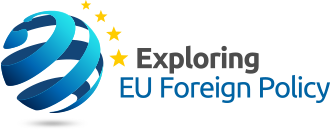An overview of non-European and non-Western perspectives and decentred approaches to EU foreign policy
The European Union’s Global Strategy correctly emphasizes that a stronger knowledge base and deeper situational awareness are needed to guide EU external action in an increasingly complex, connected and contested world.
In the same vein, the analysis and evaluation of European foreign policy require an in-depth understanding of the external or foreign context towards which this policy is projected. It is therefore essential to complement the predominantly Europe- and Western-centred approach to the study of EU foreign policy with a de-centred (i.e. non-European and non-Western) perspective.
Literature
Khakee, A., & Wolff, S. (Eds.). Transversal Democracy Projection in the Mediterranean: A De-Centred Practice Analysis. Routledge, 2024.
Lavenex, S. & Öberg, M. (Eds.). Special Issue: European Integration Outside-In: Third Country Influence on EU Lawand Policy-Making. Journal of Common Market Studies, 61(6), 2023.
Lecocq, S. & Keukeleire, S. ‘Critical and Problem-Solving Perspectives on Decentring EU External Action Studies’, Journal of Contemporary European Research, 19(2), 2023.
Carbone, M. 'When elephants fight, it is the grass that suffers: the Russo-Ukrainian conflict and the decentring-recentring conundrum in EU-Africa relations', Journal of European Integration, 45(3), 2023.
Huber, D. & Kamel, L. (Eds.), Decolonising (Knowledge on) Euro–Mediterranean Relations: Insights on Shared Histories and Futures. Rome, Nuova Cultura: IAI Research Studies 7, 2022.
Khakee, A., & Wolff, S. (Eds.). Special Issue: Transversal Democracy Projection in the Mediterranean: A De-centred Practice. Mediterranean Politics, 27(4), 2022.
Wolff, S., Gazsi, D., Huber, D., & Fisher-Onar, N. How to Reflexively Decentre EU Foreign Policy: Dissonance and Contrapuntal Reconstruction in Migration, Religious and Neighbourhood Governance. JCMS: Journal of Common Market Studies 60, 2022.
Keukeleire, S. & Lecocq, S. Decentring European Foreign Policy Analysis. In Gstöhl, Sieglinde and Simon Schunz (Eds.), The External Action of the European Union: Concepts, Approaches, Theories. Macmillan International, 2021.
Della Valle, & Giusti, C. 'Disruptions in the ENP Cycle: EU Gender Policies in Tunisia from a ‘Decentring Perspective’', European Foreign Affairs Review, 26(3), 2021.
Mishra, R., Hashim, A., & Milner, A. (Eds.). Asia and Europe in the 21st Century: New Anxieties, New Opportunities. Routledge, 2021.
Fisher Onar, N. & Nicolaïdis, K. The decentring agenda: a post-colonial approach to EU external action. In Gstöhl, Sieglinde and Simon Schunz (Eds.), The External Action of the European Union: Concepts, Approaches, Theories. Macmillan International, 2021.
Zardo, F. & Wolff, S. Special Issue: Decentering the Study of Migration Governance in the Mediterranean. Geopolitics 27(3), 2021.
Huber, D. & Paciello, M. (Eds.), Special Issue: The EU’s ‘Pragmatist Turn’ and the Struggle for Social Justice and Human Rights in the Arab World: A Decentring Framework for Analysis. European Foreign Affairs Review 25(4), 2020.
Decentring EU Foreign Policy Lectures
Online video lectures on decentring European foreign policy analysis by Prof. Dr. Stephan Keukeleire and Dr. Sharon Lecocq. Based on:
Keukeleire, S. & Lecocq, S. Operationalising the decentring agenda: Analysing European foreign policy in a non-European and post-western world. Cooperation and Conflict 53(2), 277-295, 2018.
Decentring the analysis of European foreign policy (1/9): Why decentring?
Decentring the analysis of European foreign policy (2/9): How to decentre?
Voices from around the World
Videos
Short videos of researchers and students of European foreign policy, explaining different concepts, principles and ideas from around the world.
Emilia - Ecuador/Belgium - sumak kawsay & buen vivir
Meralselin - Kazachstan - Бейбітшілік
Erika - Mexico/Belgium - autonomía
Irina - Russia - derzhavnost
Hai - China - mianze
Tatiana - Ukraine - sobornost
Marv - Albania - kanun & besa


